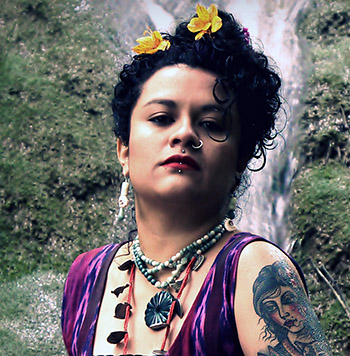
Rebeca Lane
Guatemalan hip-hop artist Rebeca Lane will perform at Bovard Auditorium Tuesday, Sept. 13, as part of an event hosted by Visions and Voices and co-sponsored by USC Shoah Foundation and El Centro Chicano. The event will be a part of the Center for Advanced Genocide Research’s conference, “A Conflict? Genocide and Resistance in Guatemala.”
Lane is a feminist rapper who is breaking down boundaries in the Latin American hip-hop scene by challenging traditional gender norms and speaking out about Guatemalan’s violent past.
Though she has been gaining attention for her musical efforts, Lane wasn’t always a rapper. Prior to her musical career, she was a historical memory activist in Guatemala working to bring attention to the Guatemalan Genocide. Lane’s parents were both activists affected by the country’s civil war, and her aunt, who she was named for, was forcibly disappeared during the conflict.
“My family wouldn’t talk about the war as openly as we needed to in order to understand what’s going on,” she said. “So when I grew up and started to research on my own, I understood and I realized what war meant and the scars and wounds it leaves on families.”
Lane originally got into rapping through poetry. After leaving an abusive relationship, she began to write and then create music, which she saw as an extension of her previous historical memory activism.
“The government tried for us to forget about [the victims] like they didn’t exist and what they did wasn’t important,” she said. “I think it’s important for me to talk about that in my music.”
In addition to the past conflicts in Guatemala, Lane also addresses the theme of violence against women in her music, which continues to be a significant issue in Guatemala, a country with one of the highest rates of femicide. She hopes to be able to share the experience of being a woman in such a country with the audience.
“There are many people who have similar experiences here in Guatemala,” she said. “So I think I am the voice for many groups.”
At the concert, Lane will perform selections from her new album Alma Mestiza, released earlier this month. The fourteen-track work touches on themes such as multiculturalism, identity, violence against women, and historical memory.
But though many of Lane’s topics are specific to her own experience and to Guatemala, she hopes that members of the audience, no matter who they are, relate.
“Usually when people hear me for the first time in other countries, we connect through the human part of pain and of rage, but also love and healing, which is what I try to put into my music — not only the things that have hurt me but also the things that help me heal my wounds,” she said.
Photo courtesy Juan Carlos Alvarado
USC Shoah F0undation interviews Rebeca before her show